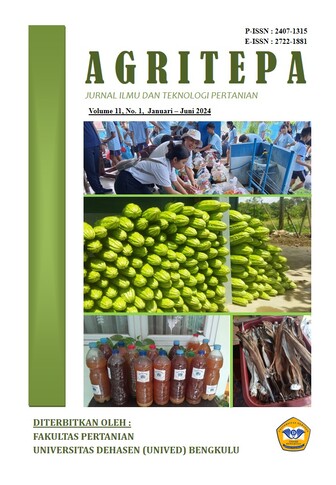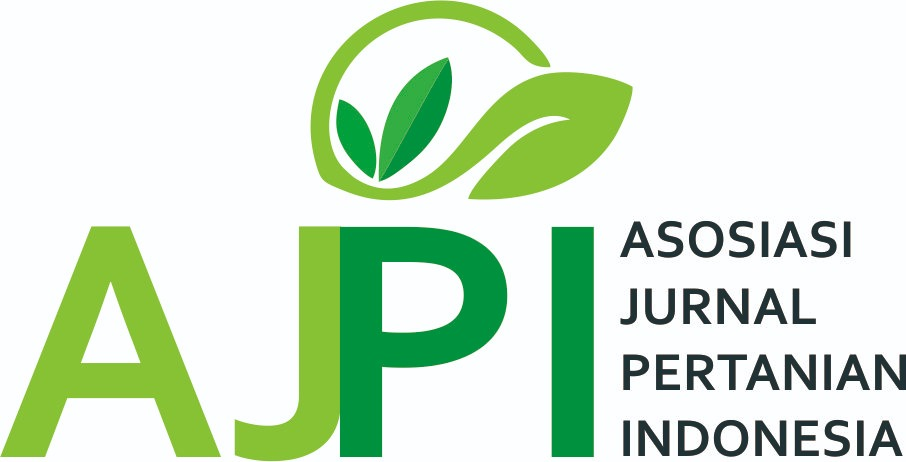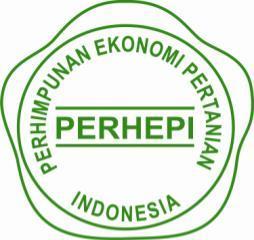Identification of The Antioxidant Activity of Bamboo Shoots a Raw Material for Manufacturing Lemea
-
Abstract
Purpose: This research aims to determine the antioxidant activity of bamboo shoots used as raw material for making lemea, a local fermented food. Methodology: The antioxidant activity of bamboo shoots was tested using the DPPH method. The research involved creating ethanol extracts from bamboo shoots of Mayan bamboo (Gigantochloa robusta), Betung bamboo (Dendrocalamus asper), and yellow bamboo (Bambusa vulgaris). The extracts were analyzed using a spectrophotometer at a wavelength of 517 nm after 30 minutes of incubation. Results: The study found that bamboo shoots used as raw material for lemea exhibited weak to very weak antioxidant activity. The IC50 values were 387.608 ppm for yellow bamboo shoots, 666.907 ppm for Betung bamboo shoots, and 799.593 ppm for Mayan bamboo shoots. Findings: The antioxidant activity of the bamboo shoots varied, with yellow bamboo shoots showing the highest antioxidant activity among the three types tested. Novelty: This research provides new insights into the antioxidant properties of bamboo shoots, specifically those used in making lemea. Originality: The study offers a detailed analysis of the antioxidant activity of different bamboo shoots, contributing to the understanding of their potential health benefits. Conclusions: Bamboo shoots, the raw material for making lemea, have weak antioxidant activity, with yellow bamboo shoots exhibiting the highest activity. Type of Paper: Experimental Research Article
Downloads
References
Almulqu, A. A. (2024). Analisis Potensi Simpanan Karbon Bambu Betung (Dendrocalamus asper). Jurnal Pendidikan Biologi, 9(1), 732–739.
Arisandi, R., Soendjoto, M. A., & Dharmono, D. (2019). Keanekaragaman Familia Poaceae Di Kawasan Rawa Desa Sungai Lumbah, Kabupaten Barito Kuala. EnviroScienteae, 15(3), 390. https://doi.org/10.20527/es.v15i3.7433
Fakriah, Kurniasih, E., Adriana, & Rusydi. (2019). Sosialisasi bahaya radikal bebas dan fungsi antioksidan alami bagi kesehatan. Jurnal Vokasi, 3(1), 1–7.
Hastuti, R. W., Primair Yani, A., & Ansori, I. (2018). Studi Keanekaragaman Jenis Bambu Di Desa Tanjung Terdana Bengkulu Tengah. Diklabio: Jurnal Pendidikan Dan Pembelajaran Biologi, 2(1), 96–102. https://doi.org/10.33369/diklabio.2.1.96-102
Iwansyah, A. C., Kumalasari, R., Darmajana1, D. A., & Ratnawati1, L. (2019). Antioxidant properties and toxicity of selected bamboo shoots “ iwung ” extract : a comparative study. IOP Publishing. https://doi.org/10.1088/1755-1315/251/1/012017
Kong, C. K., Tan, Y. N., Chye, F. Y., & Sit, N. W. (2020). Nutritional compositions , biological activities , and phytochemical contents of the edible bamboo shoot , Dendrocalamus asper , from Malaysia. International Food Research Journal, 27(3), 546–556.
Kwon, D. Y. (2015). What is ethnic food? Journal of Ethnic Foods, 2(1), 1. https://doi.org/10.1016/j.jef.2015.02.001
Lung, J. K. S., & Destiani, D. P. (2018). Uji Aktivitas Antioksidan Vitamin A, C, E dengan Metode DPPH. Farmaka, 15(1), 53–62.
Maesaroh, K., Kurnia, D., & Al Anshori, J. (2018). Perbandingan Metode Uji Aktivitas Antioksidan DPPH, FRAP dan FIC Terhadap Asam Askorbat, Asam Galat dan Kuersetin. Chimica et Natura Acta, 6(2), 93. https://doi.org/10.24198/cna.v6.n2.19049
Makatita, S. H. (2020). Pengaruh Kandungan Rebung dalam Menurunkan Kadar Kolestrol dan Tekanan Darah. Edu Dharma Journal, 4(1), 46–57.
Malik, A. A., Prayudha S, J., Anggreany, R., Sari, M. W., & Walid, A. (2021). Keanekaragaman Hayati Flora Dan Fauna Di Kawasan Taman Nasional Bukit Barisan Selatan (Tnbbs) Resort Merpas Bintuhan Kabupaten Kaur. DIKSAINS : Jurnal Ilmiah Pendidikan Sains, 1(1), 35–42. https://doi.org/10.33369/diksains.v1i1.14702
Mamay, Sulhan, M. H., & Nurjanah, S. S. (2019). Analisis Kadar Polifenol Total pada Daun Muda, Tua, dan Sangat Tua Bambu Surat (Gigantochloa pseudoarundinaceae). Prosiding Senakes 1.0, 7, 59–64.
Marcellina, R. J., Johan, H., Shinka, A., Sari, P., Nazari, A. A., Susanti, T., Waini, J., Marlina, I., Bengkulu, U., & Id, H. A. (2024). Pemanfaatan Sumber Daya Alam Kabupaten Lebong: Sumber Daya Pangan Rebung Bambu Sebagai Bahan Baku Utama Pembuatan Lemea (Makanan Tradisional Kabupaten Lebong). BIOEDUSAINS:Jurnal Pendidikan Biologi Dan Sains, 7(1), 2598–7453.
Naulandari, M., Kurniatuhadi, R., & Rahmawati. (2023). Bakteri Asam Laktat yang Diisolasi dari Rebung Bambu Apus (Gigantochloa apus) yang Difermentasi. Life Science, 12(1), 18–31. http://journal.unnes.ac.id/sju/index.php/LifeSci
Okfrianti, Y., Herison, C., Fahrurrozi, & Budiyanto. (2021). Review : Potensi Rebung Untuk Kesehatan. Jurnal Ilmu Dan Teknologi Pertanian, 8(2), 114–122. http://repository.poltekkesbengkulu.ac.id/2649/1/Artikel Potensi Rebung untuk Kesehatan.pdf
Soesanto, E. (2018a). Compounds Antioxide of Extract Yellow and Green Bamboo Shoot. Media Keperawata Indonesia, 1(1), 43–48. https://doi.org/10.1026/mki.010106
Soesanto, E. (2018b). Uji Aktivitas Antioksidan Ekstrak Rebung Bambu Apus (Gigantochloa apus Kurz) Terhadap 1,1-Diphenyl-2- Picrylhidrazyl (DPPH). Cendekia Journal of Pharmacy, 2(2), 88–94.
Sujarwanta, A. (2021). Identifikasi Senyawa Bioaktif Beberapa Jenis Daun Bambu yang Berpotensi sebagai Antimalaria. Jurnal Lentera Pendidikan Pusat Penelitian LPPM UM Metro, 7(1), 96–105.
Widjaja, E. A. (2019). The Spectacular Indonesian Bamboos. Polagrade.
Copyright (c) 2024 Yenni Okfrianti, Catur Herison, Fahrurrozi Fahrurrozi, Budianto Budianto (Author)

This work is licensed under a Creative Commons Attribution-ShareAlike 4.0 International License.
Author retains the copyright and grants the journal the right of first publication of the work simultaneously licensed under the Creative Commons Attribution-ShareAlike 4.0 License that allows others to share the work with an acknowledgement of the work's authorship and initial publication in this journal













